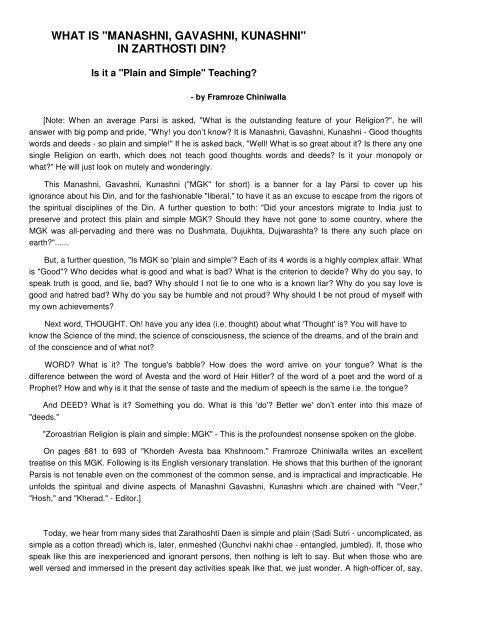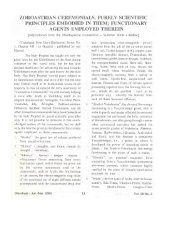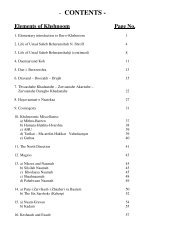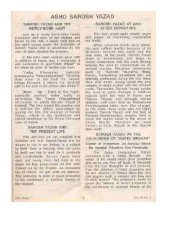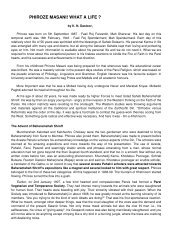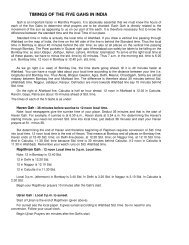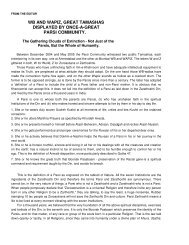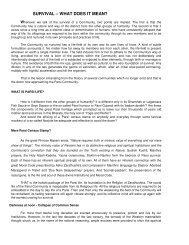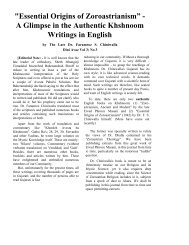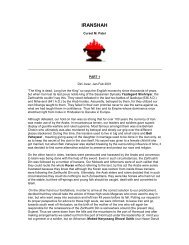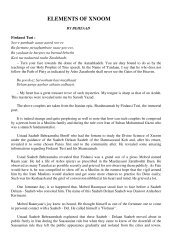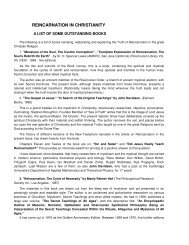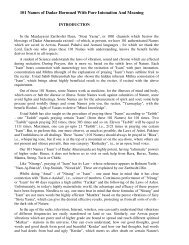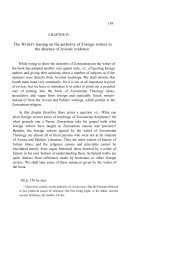manashni, gavashni, kunashni - Traditional Zoroastrianism: Tenets ...
manashni, gavashni, kunashni - Traditional Zoroastrianism: Tenets ...
manashni, gavashni, kunashni - Traditional Zoroastrianism: Tenets ...
Create successful ePaper yourself
Turn your PDF publications into a flip-book with our unique Google optimized e-Paper software.
WHAT IS "MANASHNI, GAVASHNI, KUNASHNI"<br />
IN ZARTHOSTI DIN?<br />
Is it a "Plain and Simple" Teaching?<br />
- by Framroze Chiniwalla<br />
[Note: When an average Parsi is asked, "What is the outstanding feature of your Religion?", he will<br />
answer with big pomp and pride, "Why! you don’t know? It is Manashni, Gavashni, Kunashni - Good thoughts<br />
words and deeds - so plain and simple!" If he is asked back, "Well! What is so great about it? Is there any one<br />
single Religion on earth, which does not teach good thoughts words and deeds? Is it your monopoly or<br />
what?" He will just look on mutely and wonderingly.<br />
This Manashni, Gavashni, Kunashni ("MGK" for short) is a banner for a lay Parsi to cover up his<br />
ignorance about his Din, and for the fashionable "liberal," to have it as an excuse to escape from the rigors of<br />
the spiritual disciplines of the Din. A further question to both: "Did your ancestors migrate to India just to<br />
preserve and protect this plain and simple MGK? Should they have not gone to some country, where the<br />
MGK was all-pervading and there was no Dushmata, Dujukhta, Dujwarashta? Is there any such place on<br />
earth?"......<br />
But, a further question, "Is MGK so 'plain and simple'? Each of its 4 words is a highly complex affair. What<br />
is "Good"? Who decides what is good and what is bad? What is the criterion to decide? Why do you say, to<br />
speak truth is good, and lie, bad? Why should I not lie to one who is a known liar? Why do you say love is<br />
good and hatred bad? Why do you say be humble and not proud? Why should I be not proud of myself with<br />
my own achievements?<br />
Next word, THOUGHT. Oh! have you any idea (i.e. thought) about what 'Thought' is? You will have to<br />
know the Science of the mind, the science of consciousness, the science of the dreams, and of the brain and<br />
of the conscience and of what not?<br />
WORD? What is it? The tongue's babble? How does the word arrive on your tongue? What is the<br />
difference between the word of Avesta and the word of Heir Hitler? of the word of a poet and the word of a<br />
Prophet? How and why is it that the sense of taste and the medium of speech is the same i.e. the tongue?<br />
And DEED? What is it? Something you do. What is this 'do'? Better we' don’t enter into this maze of<br />
"deeds."<br />
"Zoroastrian Religion is plain and simple: MGK" - This is the profoundest nonsense spoken on the globe.<br />
On pages 681 to 693 of "Khordeh Avesta baa Khshnoom." Framroze Chiniwalla writes an excellent<br />
treatise on this MGK. Following is its English versionary translation. He shows that this burthen of the ignorant<br />
Parsis is not tenable even on the commonest of the common sense, and is impractical and impracticable. He<br />
unfolds the spiritual and divine aspects of Manashni Gavashni, Kunashni which are chained with "Veer,"<br />
"Hosh," and "Kherad." - Editor.]<br />
Today, we hear from many sides that Zarathoshti Daen is simple and plain (Sadi Sutri - uncomplicated, as<br />
simple as a cotton thread) which is, later, enmeshed (Gunchvi nakhi chae - entangled, jumbled). If, those who<br />
speak like this are inexperienced and ignorant persons, then nothing is left to say. But when those who are<br />
well versed and immersed in the present day activities speak like that, we just wonder. A high-officer of, say,
a Bank or Insurance Company, who is very competent in his vocation, can advise others as to how good is a<br />
particular Bank or what Insurance policy one should take out; they are competent to so advise. But if such<br />
persons speak about the Din, they must be equally competent in the matters of Din. But when such people<br />
are asked about their own knowledge and reading, it is found that they DO NOT KNOW the Din; they cannot<br />
read about it; they have no time to read. When such people do not give a right to others, who are ignorant in<br />
their specialised lines, to say anything thereabout, how can they say anything about the Din? They are not<br />
even conscious that they have just no right to speak on a subject of which they are ignorant! Today, since the<br />
Western knowledge is in full swing, each and every thought is in the clutches of materialism. Therefore the<br />
education based on such thoughts have led astray such worldly competent people. Not only that, but even in<br />
such fraud less institution as khshnoom, there is a grip of the hi-fi thinking of the alleged high progressive<br />
times and studies although there is less place for them.<br />
ARE YOU SURE, OUR MIND IS<br />
ENTIRELY CLEAN AND YOUR HEART<br />
ENTIRELY PURE?<br />
It is stated in the first place that there is nothing in our Din but just Manashni, Gavashni, Kunshni<br />
("MGK"). That is, the Prophet has taught to keep the mind clean and the heart pure, because He did not have<br />
airy views. But was He "practical" i.e. one who could see straight-forward? He observed that the life work<br />
would be achieved by MGK and He has commanded accordingly to do MGK. Those who say and ask others<br />
to believe in this are themselves not depicting PRACTICAL TRUTH which we see every day, but are talking in<br />
the air.<br />
If there are any persons who get the opportunity of observing varied kinds of intelligence and thoughtprocesses<br />
in mankind, they are the lawyers, doctors, medical men, business-men, and those who run banks,<br />
insurance companies and the like. Of these, the lawyers and business-men get many opportunities to see the<br />
practical side of human behaviour, whereas the doctors and medical men get the opportunity of observing<br />
how strong is the hold of bodily emotions on the human mind. Such widely experienced persons know, and<br />
can be well informed through their experience, that to keep good thought, word and deed is not practical<br />
for the humans, but is a story of some "Styaayoog" - an airy remote time. It is well known that many a<br />
times an honest Judge sitting on a chair of Justice, feels that an accused is guilty of a serious offence and yet<br />
he is compelled to acquit him much against the Judge's conscience due to some legal technicality, giving the<br />
accused benefit of doubt, in due deference to law. If in the present times, Manashni, Gavashni, Kunashni is<br />
not fully current in the houses of Justice, it is easy to understand that MGK behaviour cannot be practically<br />
put in practice. Which person, today, shows the courage of acting according to his conscience? Everybody<br />
revolves his Manashni, Gavashni, Kunashni in any direction according to his own selfishness. The other<br />
name of this is UNTRUTH. This is what is actually and forcefully happening today in our practical life.<br />
WHAT IS WRONG IN THAT?<br />
Every doctor of today knows that every human has reflex actions, like the mouth waters on seeing the<br />
food that is, the thought of eating results in releasing saliva; or the sexual attraction between man and woman<br />
results in certain bodily changes. These are natural thought-reactions. Doctors call them physiological facts.<br />
The present-day material thinking refuses to believe that the mind can control these reflexes. And some go to<br />
the extent of asking: why, should there be such control? They do not see anything wrong in eating away any<br />
food they come across; much worse, they think, it is practical to satisfy the sexual urge in whatever way it<br />
comes. Thus today, when the human life is seen immersed in such practical side going entirely contrary to the<br />
true Manashni, Gavashni, Kunashni, then this tall talk of MGK seems to be a piece of airy thinking. This
means, today's way of life considers it impractical to keep a control on one's MGK, and that is the<br />
reality. Somebody wants: "I should not sin" and yet he does it. Somebody wants: "I would be away from<br />
certain thing", and yet he is involved in the thing. In this 'Kali-Yug', people are going around and round in this<br />
way, since years and years. That itself proves that to live according to the true MGK has become almost<br />
impossible in this age, because the circles of bodily hungers and passion go on whirling round and round, and<br />
the straight path, which is called MGK, is unable to establish its power since thousands of years. And that is<br />
why those pundits of modern age consider as airy babble the way of controlling the bodily hungers.<br />
ZOROASTER, SO IMPRACTICAL?<br />
Thus, if it is not practical and practicable to adopt MGK, then Zarathushtra, who is alleged to have said<br />
that MGK is the only principle of life, should Himself be branded as impractical. But we see today that there is<br />
not a single thing in this world, which is easy to get. For achieving any worldly goal, there is no royal road;<br />
then how can a human see, on his own ability, the straight and narrow path in the matters of Religion?<br />
Experience proves to us that not all can adopt true MGK, even if they want to. Then how can the concept of<br />
"plain and simple" be there, in Religion? If Manashni does not remain good, what can one do? If one is unable<br />
to keep his 'Gavashni' true, what can one do? If one cant help going on doing evil things, what can one do?<br />
What is the answer to this? If man can retain MGK in a "plain and simple" way, how can evil survive in the<br />
world? (Courts of law will close down - Ed.).<br />
Man does not remain in carnal desires all the time. At the time when he has peace of mind he does get<br />
thoughts of 'the good'. He may desire to have goodness all the time, yet he is unable to have it. This is a<br />
gigantic problem before the whole of mankind, before each and every person, and before his rational practical<br />
thinking.<br />
The constitution of man, physical or unseen-ultra physical is such that he just cannot stick to the truth of<br />
MGK. The body given to him by nature is capable of doing good and evil both. That proves that there is and<br />
cannot be just "plain and simple"; but good and evil are endeavouring to gain victory over each other.<br />
That is why everybody is ordered to be a "Rathestaar" soldier. One who cannot become such a soldier, is<br />
called a "Hutox", who gets a beating when he strives to be on the side of good, and is entangled in "Sansaar"<br />
(worldly life). Din has here explained the law of dual phases in human nature. Every human has a tongue; he<br />
can eat anything he likes, and can speak truths and lies both. He has sexual organs and surrenders to his<br />
emotions, wherein he may violate or not violate the morality. Thus, the tongue eats or speaks; the physical<br />
senses may succumb to emotions and passions which may be moral or immoral; there is no control on them<br />
in the present times. These are bodily storms, on which there is no restraint. One can have the control if he<br />
has a strong will to resist. The Tarikats of the Din are meant to develop such will and resistance.<br />
There is a special machinery in the humans viz., the bite of conscience, which can invoke itself on the<br />
commission of a sin. Every human has that bite, which induces him to think that a certain act is wrong or right.<br />
But this conscience bite also becomes dormant and inactive. As one can augment the strength and<br />
activity in one's muscles and organs and also in mind's will power, so one can do to keep his conscience<br />
activated and prevent it from becoming inactivised. This goes on happening in man, but he does not know<br />
how it happens. When we are not aware how the machinery of the body works, how can we boast of<br />
operating it according to our will? It is not at all easy to sustain good thoughts and to control carnal emotions.<br />
That is human nature. Therefore we require some methods, procedures, practices, techniques to be out<br />
of evil thoughts, words and deeds and adopt MGK. Without showing such methods and techniques, just to<br />
go on babbling that man should have good thoughts words and deeds, is inconsistent with the human nature,<br />
which is predominantly inclined to evil. That is why the Din teaches about the dual disposition in man, and has<br />
shown the way of Tarikat to develop the strength and energy to resist the evil side and flower the good. When<br />
man is unable to walk on the side of good but goes on swinging in carnal emotions, the Din provides the royal
ode of Tarikat, which is called - (Path) in Avesta.<br />
SEEDS OF TRUTH ARE DRYING UP.<br />
As said above, man's body is a mesh of passions and emotions; but the same body occasionally brings<br />
out good thoughts. This proves that the body has in it the seeds of truth. But the storm of carnal emotions<br />
causes them to fly astray and not to settle down on the soil of the body; they therefore do not catch the roots<br />
and grow up. Each and every human has within him the hidden knowledge of the Truth. Every human has in<br />
him the Sermon on the Mount, i.e. the hidden knowledge to go to the 'Aasmaan's of "Hasti" (the skies of the<br />
Divine World, which is named as 'Hasti' in the mystical science of the Din. - Ed.) It is the dormant (often<br />
unconscious) Knowledge that man has to open up the road leading to that Mount, which lies within himself,<br />
and climb it so as to reach the Hasti….. Every human has in him or her Praan - Aatmaa - Ushtaan (soul, the<br />
Divine Body, the Divine Consciousness, the Divine Light). This has the roots of Divine Wisdom - Baaodaang.<br />
It has hidden in it the Truth itself, which has Divine Energies named as : "Manashni, Gavashni, Kunashni,<br />
Veer, Hosh, Kherad'. ("Doaa Naam Setayashney”). These themselves are the Seeds of Divine Truth in Man.<br />
But they are dormant, latent, embryonic. They are required to be cultivated, developed and flowered<br />
out, and activated and energised, so as to enable us to put them in practice in our daily life, every<br />
moment. The ground of the bodily senses and sensuality is stony; the stones are to be uprooted, the ground<br />
is to be fertilised and the Seeds of Truth, which are already there, are to be allowed to grow up.<br />
"Sermon on the mount" is a list of commands for taking us to our spiritual goal. (The Mount is within<br />
every human. Lord Jesus pointed it out to man-kind by delivering His Sermon from a mount on the earth. We<br />
have to climb the Mount within us. -Ed.) Those commands, in our Din, are called 'Daz Andrazna Beya' - the<br />
seeds of ten commandments, i.e. ten Rules of life to tread the Path to Ahura, which is our life's duty. (Religion<br />
means Duty, from Latin "Religare" to bind - in duty bound - Ed.) These seeds are within every human; animals<br />
do not have them. Animals' progress (spiritual, not Darwinian) is based and balanced on the humans. Tilling<br />
a soil full of stones calls for robust exertion; perspiration oozes out, limbs are injured, hands and feet<br />
suffer injuries, we feel tired and depressed; because in spite of practising Tarikat, the bodily<br />
sensualities do not give up; carnal emotions remain. But it is ordained that ultimately the stones will<br />
be uprooted and the beautiful garden of Manashni - Gavashni - Kunashni - Veer - Hosh - Kherad will<br />
flower out.<br />
Thus, to give a pretentious importance to bare morality in the name of Manashni - Gavashni - Kunashni is<br />
as futile as carrying - importing coal to New-Castle, where coals are in great abundance. In the castle of the<br />
body coals of morality are there, but they are to be alchemised to diamonds. (Coal and diamond are the two<br />
forms of the same element carbon, which again, is the founding element of life on earth. All life-molecules are<br />
carbon based. - Ed.) Real exertion in life is to cultivate the stony land of sensualities. How to do this farming<br />
of tilling the ground is taught to us by the Prophet of Minoi eyes, which is termed as 'Peth' (Path) in the Gatha.<br />
* * * * *<br />
[Note: The Path of Tarikat is the Path of Truth, Path leading to Ahura, the Path prescribed by the Din. So<br />
says Gatha 30-2 and Hadokht Nask, Pargarad 2 as also several other Avesta passages. In the above treatise<br />
in Khordeh Avesta baa Khshnoom, Framroz Chiniwalla deals with these two on pages 686 to 690].<br />
THE PATH AND THE PROMISE<br />
Ye every human who has a physical body! You have within you the Divine ears, that is, Energy Centers<br />
("Chakhra"s). Follow with full faith the Spiritual Prescriptions, and tread the Divine Path as prescribed by the<br />
Din.
You will then hear the sound of Ahura - the sound of Sarosha, in your Divine ears. Your consciousness<br />
and conscience will then become illuminated.<br />
And you will then directly SEE through your own developed eyes, the Eternal Creation, and attain the<br />
Enlightened Knowledge of the Spirit, and the Wisdom of the Din.<br />
- Gatha, Yaz. Ha 30-2<br />
* * * * *<br />
Blessed are the pure in heart, for they shall SEE God –<br />
- Sermon on the Mount, Mathew 5-8<br />
* * * * *<br />
Five root causes of the darkness of our mind: Ignorance, ego, attachment, aversion, the lust to live.<br />
- From Patenjali : (though Swami Prabhavaanand in<br />
"Sermon on the Mount according to Vedanta."<br />
(Parsi Pukar Jan.-Feb.-Mar. 2005 - Vol. 10; No. 3)


